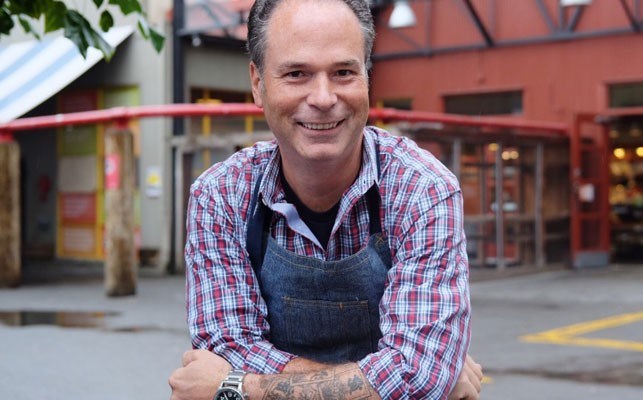As a food writer and occasional gourmand, I've thought a lot about what exactly Canadian cuisine is.
In the same way we humble Canucks often struggle to define Canadian identity, our food culture can be equally ambiguous. Considering poutine, of all things, is widely considered our de facto national dish, it's safe to say the general perception of Canadian cuisine is a little bit lacking. But if there's anyone who's qualified to define our nation's food culture, it's Chef Eric Pateman, who grew Edible Canada from "a tiny one-man culinary concierge service into one of the leading ambassadors of Canadian cuisine." He also runs a consulting firm that has worked with everyone from the federal government to Destination BC to market Canadian food to the world.
"I am armpit-deep in this very question," he said with a laugh.
"The definition we use for Canadian cuisine that seems to be fairly well adopted from coast to coast now is: Local, seasonal, sustainable ingredients in the hands of many cultures."
That ethos will be on full display at next month's Cornucopia festival when Pateman hosts a lunch meant to showcase the diversity of Canadian cuisine. The Culinary Stage Series event, called "Canada's 150th – A Cultural Culinary Journey," will feature a range of essential Canadian ingredients filtered through the multicultural lens of their respective regions, all paired with award-winning wines from Lunessence Winery.
"When you look at the menu we put together for this weekend, you go into it with these really traditional ingredients, like goat cheese, elk, Atlantic sturgeon, Okanagan apples, but they're done with everything from a chilli and miso influence, pickling — it kind of goes a little bit all over the place," Pateman explained. "It's that no-rules mentality."
Pateman mentions that mindset as a particularly liberating factor for Canadian chefs today.
"Historically, we've always been a list of commodities — this is what we grow, therefore this is what we are," he said. "We are this cultural melting pot, but we're also not bound by any culinary rules or traditions like other countries are. So you can combine Thai, Indian, Japanese and French all into the same dish, and not even blink an eye — as long as it tastes good."
It's these duelling influences — geography and multiculturalism — that has truly helped forge not only Canadian food culture, but Canadian culture in general, and it's translated into one of the most eclectic, high-quality food scenes the world over. Pateman references a study by the University of Gastronomic Sciences in northern Italy as a prime example. In 2015, a team of researchers took on the difficult task of nailing down our country's cuisine once and for all. After sampling 63 dishes from a United Nations of different ethnicities, they came to the conclusion that almost every dish they ate "was better than it would have been in the home country that dish originated," Pateman recalled.
A veteran of Cornucopia and food festivals in general, Pateman had high praise for Whistler's annual gastronomic bacchanal.
"It's the only festival where I know we'll see 50 or 60 people at this lunch, and I'm probably going to see three-quarters of them, if not all of them, at my restaurant (Edible Canada's Granville Island pop-up) within a month after the event," he said. "The return on Cornucopia is amazing. Everyone's there for the same reason: to eat good food, drink good wine, and have a great time."
A Culinary Cultural Journey is scheduled for Saturday, Nov. 11 from 12:30 to 2:30 p.m. at the Whistler Conference Centre. Tickets are $75, available online at whistlercornucopia.com.




